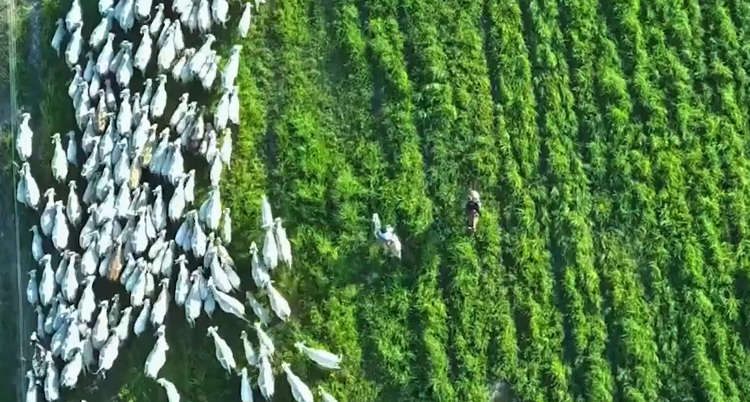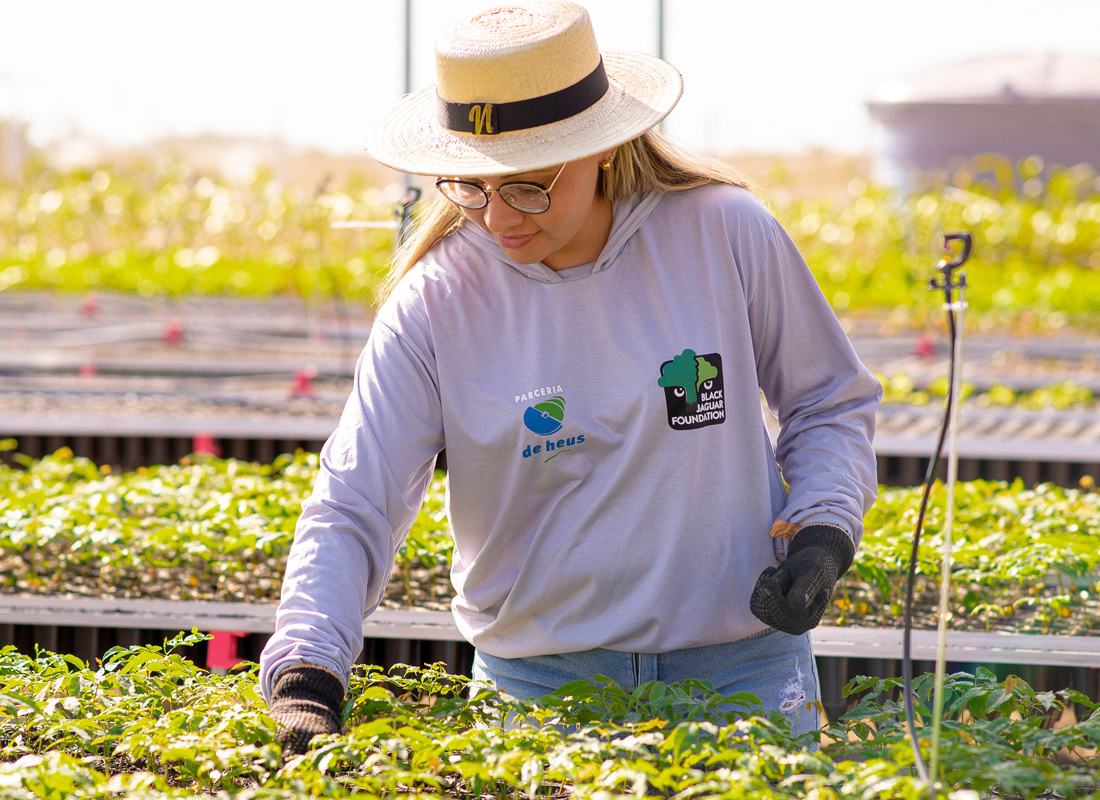An inspiring restoration project with local farmers: Realising the Araguai biodiversity corridor in Brazil
Summary
In order to reconnect the Amazon rainforest and Cerrado savanna, De Heus collaborates with the Black Jaguar Foundation in Brazil to rehabilitate the Araguaia Biodiversity Corridor. Local farmers that support biodiversity by preserving land include Marcos Mariani, Carlos Felix, and AgroSB. Overcoming obstacles, the De Heus-backed project prioritizes long-term dedication and a methodical approach. Because they grant access to land and provide funds for nurseries, farmers are essential. Benefits from the law and business backing increase the project's sustainability. The Black Jaguar Foundation, De Heus, and farmers have partnered to demonstrate the synergistic potential of production and preservation, which will help Brazil's biodiversity.
Acquiring raw materials from sustainable sources means protecting natural ecosystems and biodiversity. To support global conservation, De Heus is a long-term partner of the Black Jaguar Foundation. Founded by Ben Valks in 2009, this non-profit organisation works committed to restoration along the banks of the Araguaia River, which connects the Amazon rainforest and the Cerrado savanna in Brazil, two of the world’s most important ecosystems.

By planting a wide variety of native trees on a massive scale, the project will create the Araguaia Biodiversity Corridor, a vital artery for many thousands of native tree and animal species living in the two ecosystems. Participation by local farmers is integral to the project, not only because their land borders the Araguaia River, but also because agriculture depends on the river, its ecosystems, and their contribution to the environment. In addition, the corridor is of critical importance to the farmers, because of its water and soil, and because of legal requirements. Three farmers explain why they have partnered with the Black Jaguar Foundation team in the region, how they work together and what the world should know about Brazilian land-owners and preservation.
To restore degraded areas of land
“I’m an agronomist and my family has always been concerned about preservation,” says Marcos Mariani, whose Fazenda Santa Fé was one of the first farms to partner with the Black Jaguar Foundation. “It’s impossible to produce cattle and crops without preservation.” Marcos first realised this when a drought in 1997 caused a great deal of vegetation loss in the region. “There were already high rates of land degradation so it motivated me to become involved in conservation, and eventually I founded an NGO, Preserve Amazonia, to raise awareness.” Carlos Felix is the owner of 1,500-hectare Bela Vista farm, located along the Araguaia River, and he’s equally passionate about nature. “I have a post-graduate degree in environmental science and I’m very involved in restoring the Araguaia margins,” he says. “About 51% of my farm is intact native forest which is very unusual.” Another landowner, AgroSB, operates five farms in the state of Pará and the company wants to show that agriculture and nature can go hand in hand. “We are committed to zero deforestation and have very high Environmental, Social and Governance standards,” says Cristiano Soares, CEO of the five farms. “An environment that’s in equilibrium benefits agricultural production. For example, during the rainy season, if you have well preserved forest, drainage of production areas is much better.”
Long-term commitment
Given this shared commitment to land preservation, it’s no surprise that these farmers were receptive to the Black Jaguar Foundation’s ambitions. Nevertheless, the foundation always has to overcome a few misgivings. “Other organisations with big ambitions, started restoration projects in this remote region, but they failed to keep their promises,” says Ben Valks. “They underestimated the complexity of the undertaking. For example, in our 17-steps Cycle of Restoration, we grow and plant about 70 different species of native trees and we have to do it without a proper infrastructure. We have to build everything from scratch.” Brazil is a vast country and the Black Jaguar Foundation works in a very remote area without properly working electricity and water systems. Restoration is not for the faint-hearted. “We have to explain to farmers that we’re here to stay,” Ben continues. “The first 1,000 hectares of land we restore are important because it gives landowners confidence. A long-term partnership with a global agri-company like De Heus also helps.”
De Heus’ long-term support for the project includes contributing to the building and upkeep of a large-scale tree nursery for annual production of 500,000 native trees, the creation of a seed collection initiative, and training that enables local community members to prevent and fight forest fires. De Heus’ ongoing contribution is also being used to support the planting of hundreds of thousands of native trees in the Araguaia Biodiversity Corridor in the coming years.
“The first 1,000 hectares of land we restore are important because it gives landowners confidence. Long-term partnership with a global agri-company like De Heus also helps.”
Step-by-step approach
In addition to negative experiences with previous restoration initiatives, the Black Jaguar Foundation also has to overcome resistance to outsiders. “Some farmers are worried restoration organisations are going to point the finger and draw unwelcome attention to deforestation,” says Cristiano. As a result, the Black Jaguar Foundation team has to be very careful in its initial approaches to farmers. “Their first contact with producers is very respectful and professional,” says Carlos. “They also have a good, well-structured plan.” Marcos agrees: “The foundation has an excellent approach. They use very clear language so it’s easy to talk to them and their people are very committed.” The Black Jaguar Foundation’s step-by-step approach also helps it to connect to farmers. “They don’t want to expand at all costs,” Carlos adds. “They want to achieve results gradually.” Starting slowly and focusing on quality rather than quantity is key for the Black Jaguar Foundation. “It’s better to have a small area with good results than a bigger area with poor results,” Ben explains. “By the end of next year, we will have planted 2 million trees with a survival rate of 90%. It’s about quality, long-term outlook and scale.”
Specialised knowledge and experience
Although driven by their own enthusiasm for preservation, Carlos, Marcos and Cristiano are also legally required to both preserve native forest and restore deforested areas on their land, but they can’t do it on their own. “You need technical knowledge and resources, a professional structure and a road map,” says Marcos. “It’s also expensive.” The Black Jaguar Foundation meets these vital needs. “Replanting native trees and restoring biodiversity are very different to monoculture farming like soybean and corn,” says Cristiano. “We need the foundation to provide the specialised knowledge and physical support.” Ben explains further: “It takes a lot of skill and experience. You have to know which native trees to plant, where and when to plant them, in what mix, and how to maintain them. A lot of farmers want to preserve the environment and local ecosystems with native biodiversity, but don’t have the knowledge and expertise.” At the end of the day, a farm is a business that has to produce and a restoration partner has to take this into account. “You can’t protect the environment without taking care of the commercial side, you have to do both together and find a good balance” adds Marco. “The Black Jaguar Foundation team understands that.”
Funding a nursery
The farmers’ support for the foundation’s goals goes beyond allowing access to their land and facilitating the restoration workers. They often step in and provide additional help when the Black Jaguar Foundation needs it. “A few years ago, we needed a new nursery which we just couldn’t afford. This was before we had several long-term sponsors like De Heus,” Ben says. “We made a proposal to Marcos and he funded and created the nursery at his own farm. Landowners in Brazil are doing much more for land preservation and restoration than people know, especially outside Brazil.”

Legal benefits
Many people outside Brazil are unaware of the Brazilian Forest Code, which requires every rural landowner to preserve a certain area of their land for nature, this is where the Black Jaguar Foundation comes in. So as well as preserving the quality of the soil and water for agriculture, the project benefits farmers from a legal standpoint. “In my state, Tocantins, currently there isn’t a lot of enforcement of legislation relating to land restoration and preservation,” says Carlos. “But when the government starts to enforce regulations, compliant farmers will avoid fines and be able to secure loans more easily. In this way, the Black Jaguar Foundation is ahead of the times.”
Supporting work in the field
What do farmers think of the Black Jaguar Foundation’s partnership with De Heus? “It’s a great partnership because De Heus is supporting preservation in agricultural regions,” says Marcos. “Some commercial companies are buying up farms, reforesting them and then selling carbon credits but that’s not preservation.” Cristiano sees the partnership from a more commercial viewpoint. “This kind of contribution is very important because companies in Europe have to show that their products come from sustainable sources,” he says. “The project helps us sell our crops and cattle.” For Carlos, the partnership will help guarantee the Black Jaguar Foundation’s long-term success. “The partnership helps to highlight what’s happening here in the Araguaia River region. It will strengthen the project and allow the foundation to expand and achieve its goals.” In short, it’s a four-way win for the farmers, De Heus, the Black Jaguar Foundation and biodiversity in Brazil.
“Replanting native trees and restoring biodiversity are very different to monoculture farming like soybean and corn. We need the Black Jaguar Foundation to provide the specialised knowledge and physical support.”
Production and preservation
Marcos believes that along with big companies, other groups need to support the Black Jaguar Foundation. “The public should understand the importance of projects like this and become involved,” he says. “Brazilian and European politicians also need to be aware of restoration projects and promote agricultural production and conservation.” Broader awareness of farmers’ preservation efforts will also help repair their tarnished image. “A lot of the time, producers are seen as the people who are destroying the natural environment,” says Carlos. “But in our region, land-owners are very committed to preserving local ecosystems and the environment and when people see what we’re doing for themselves, they change their minds. We’re showing it’s possible to produce and preserve together.”





